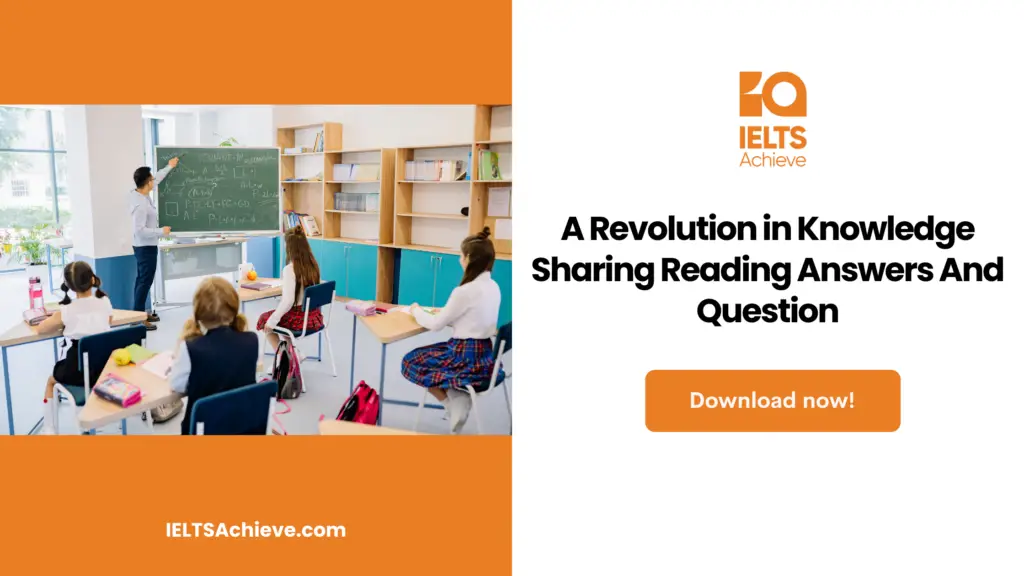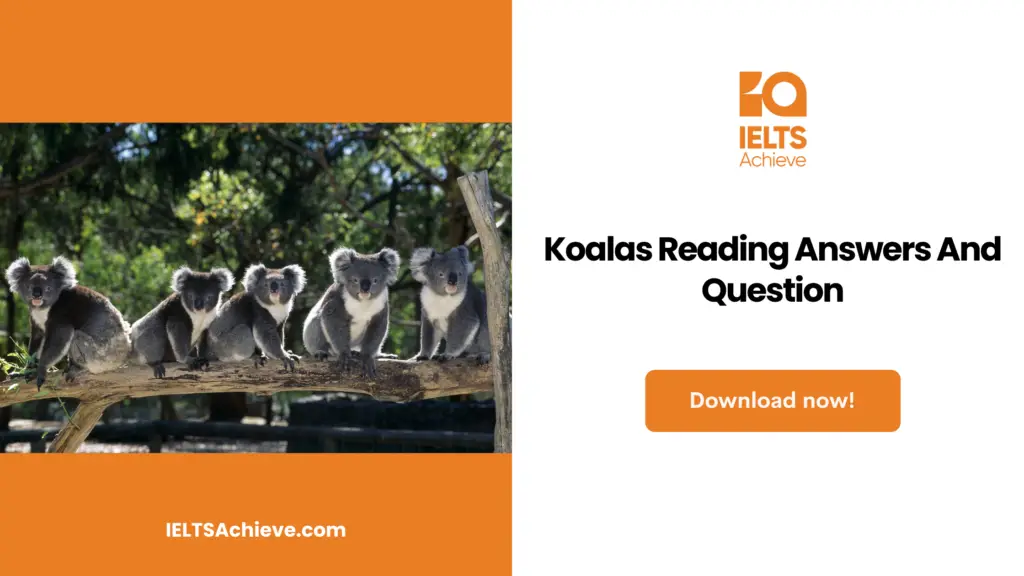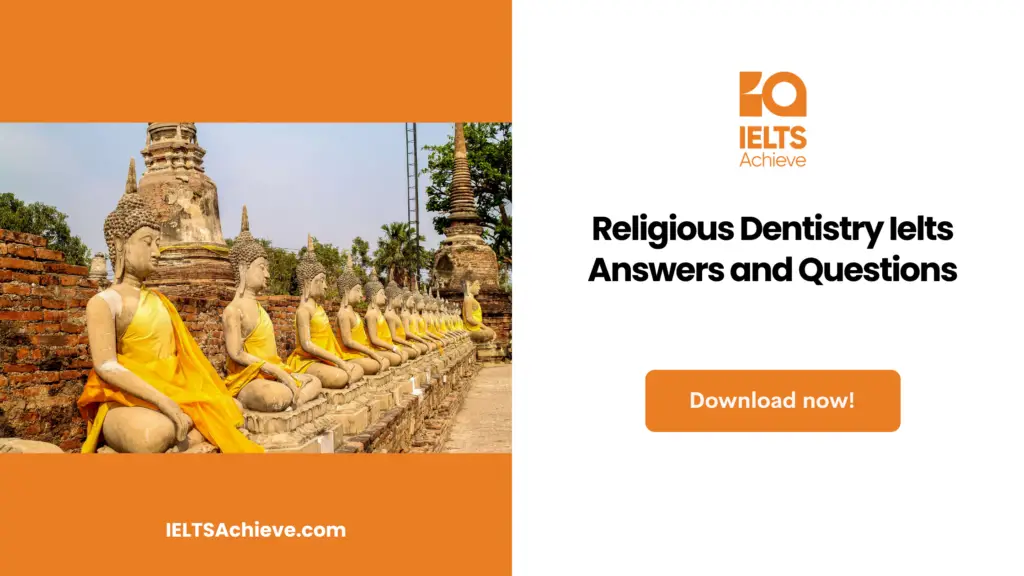The Blog post contains the following IELTS Reading Questions:
- IELTS Reading Yes/NO/Not Given
- IELTS Reading Sentence Completion
Stay informed and prepared for success – Explore our comprehensive Reading Test Info page to get valuable insights, exam format details, and expert tips for mastering the IELTS Reading section.
IELTS Reading passage – A Revolution in Knowledge Sharing

A Revolution in Knowledge Sharing
The pressure to transform our institutions of learning continues. Virtually every enterprise and institution are grappling with the disruptions and opportunities caused by Web-enabled infrastructures and practices. New best practices, business models, innovations, and strategies are emerging, including new ways to acquire, assimilate, and share knowledge. Using technologies that are already developed or that will be deployed over the next five years, best practices in knowledge sharing not only are diffusing rapidly but will be substantially reinvented in all settings: educational institutions, corporations, government organizations, associations, and nonprofits. But institutions of learning are in a unique position to benefit from an added opportunity: providing leadership in e-knowledge.E-knowledge finds expression in many shapes and forms in a profoundly networked world. It is not just a digitised collection of knowledge.
E-knowledge consists of knowledge objects and knowledge flow that combine contents, contexts, and insights on applications. E-knowledge also emerges from interactivity within and among communities of practice and from the troves of tacit knowledge and tradecraft that can be understood only through conversations with knowledgeable practitioners.E-knowing is the act of achieving understanding by interacting with individuals, communities of practice, and knowledge in a networked world. E-knowledge commerce consists of the transactions based on the sharing of knowledge. These transactions can involve the exchange of digital content/context and/or tacit knowledge through interactivity.
Transactable e-knowledge can be exchanged for free or for fees. E-knowledge is enabling not only the emergence of new best practices but also the reinvention of the fundamental business models and strategies that exist for e-learning and knowledge management. E-knowledge is technologically realized by the fusion of e-learning and knowledge management and through the networking of knowledge workers.Transactable e-knowledge and knowledge networking will become the lifeblood of knowledge sharing. They will create a vibrant market for e-knowledge commerce and will stimulate dramatic changes in the knowledge ecologies of enterprises of all kinds. They will support a “Knowledge Economy” based on creating, distributing, and adding value to knowledge, the very activities in which colleges and universities are engaged. Yet few colleges and universities have taken sufficient account of the need to use their knowledge assets to achieve strategic differentiation.
In “It Doesn’t Matter,” a recent article in Harvard Business Review, Nicholas G. Carr endorsed corporate leaders’ growing view that information technology offers only a limited potential for strategic differentiation. Similar points are starting to be made about e-learning, and knowledge management has been under fire as ineffectual for some time.The truth is that e-learning and knowledge management can provide strategic differentiation only if they drive genuine innovation and business practice changes that yield greater value for learners. Carr’s article provoked a host of contrary responses, including a letter from John Seely Brown and John Hagel III. Brown is well-known for his insights into the ways in which knowledge sharing can provide organizations with a solid basis for strategic differentiation.
Unlock your full potential in the IELTS Reading section – Visit our IELTS Reading Practice Question Answer page now!
Recommended Questions:
Renewable Energy IELTS Reading Question with Answer
For questions 1-4,
choose NO MORE than TWO WORDS for each answer.
Thanks to the advent of the computer, learning institutions today are providing new ways of acquiring knowledge, through tools that are 1……………….. fast and which are being already 2…………………. in all fields and settings, despite the 3………………. the process may entail, which all institutions are now 4………………………….
Enhance your sentence completion skills in the IELTS Reading section. Click here to access our comprehensive guide and learn effective strategies for filling in missing words or phrases in sentences.
Questions 5-9
In boxes 5 – 9 on your answer sheet, write
YES if the statement agrees with the views of the writer
NO if the statement contradicts the views of the writer
NOT GIVEN if it is impossible to say what the writer thinks about this
5. E-knowledge is primarily based on practices used in business.
6. Educational institutions can be leaders in knowledge networking.
7. E-knowledge has several benefits to it.
8. Communities of practice are one source of E-knowledge.
9. The key to the success of knowledge management and e-learning is offering strategic differentiation.
Want to excel in identifying the writer’s views and claims? Click here to explore our in-depth guide on how to accurately determine Yes, No, or Not Given in the IELTS Reading section.
Unlock your full potential in the IELTS Reading section – Visit our IELTS Reading Practice Question Answer page now!
Recommended Questions:
Renewable Energy IELTS Reading Question with Answer
Answer:
1. diffusing
2. deployed
3. disruptions
4. grappling with
5. NO
6. YES
7. YES
8. YES
9. YES
Ready to improve your performance in Multiple Choice Questions (MCQs)? Click here to access our comprehensive guide on how to tackle MCQs effectively in the IELTS Reading section.

